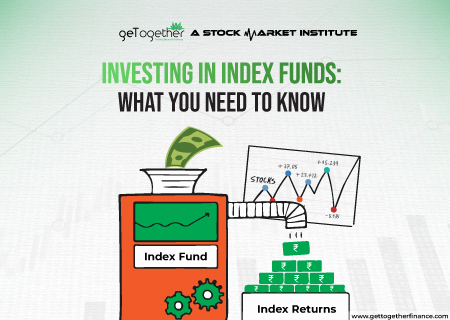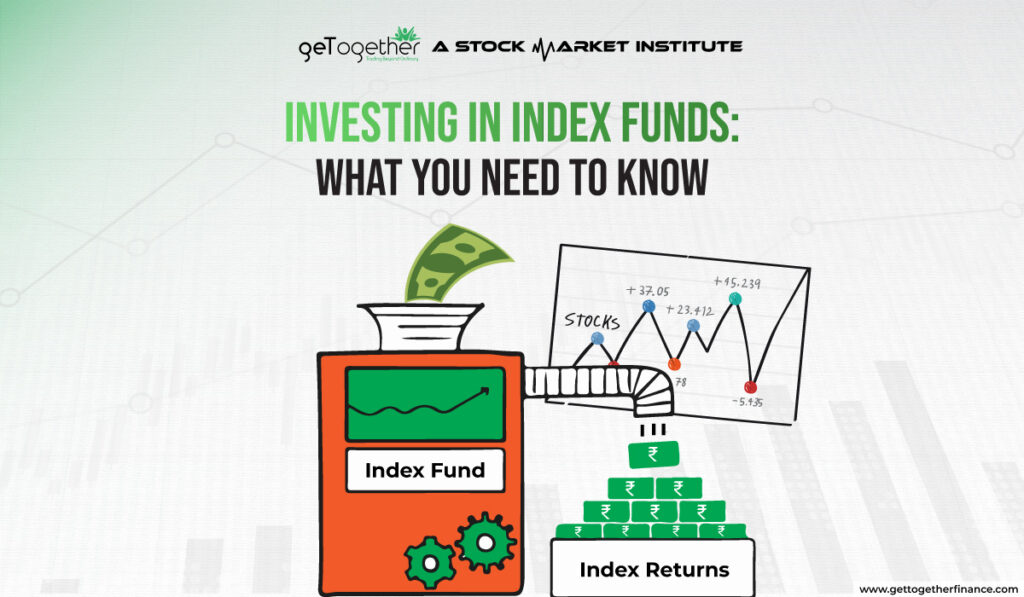Investing in Index Funds: What You Need to Know


Introduction
Index funds are based on an index as an underlying asset; index funds works on the performance of certain indexes like NIFTY 50, NIFTY PSU, etc. It is done by holding the same stocks and securities as an index and managing the performance in a mirroring way. They are extremely popular for steady investors because of low risk, stable returns, and cost-effectiveness.
Investing in index funds via SIP or a one-time method is an excellent way to save and grow money because it offers diversification to your invested capital. In turn, reducing the risk of losing it all at once. Further, the cost effectivity is another great factor contributing to these funds for becoming more popular; they have comparatively lower fees than actively managed funds.
The wise range of companies, specially selected on sector or market cap base are known to outperform actively managed funds in the long run. This makes these funds a go-to investment option for beginners as well as experienced investors. Let’s dive deep into the world of index funds and understand how they are so popular.
What Are Index Funds?

Index funds are a type of mutual funds or ETFs that are designed to track the performance of a specific market index and give returns based on its performance. They hold the same securities or stocks as the index, which helps in growing the investment equivalent to the growth of the market. The primary goal of of them is to provide returns in line with the market growth, rather than trying to outperform it by active management; hence giving a sense of security and assurance to the investors.
How They Work
Index funds operate on a passive management strategy. It implies that instead of actively making changes to the fund based on market conditions, the fund simply buys and holds securities that are pre-decided for the index. For example, the NIFTY50 index fund will hold the stocks of NIFTY50 (The top 50 largely traded companies of NSE). the fund’s performance will rise and decline based on the performance of NIFTY. This approach actively minimizes the transaction costs in the funds, making it a low-cost fund compared to actively managed funds that have to engage in regular buying and selling of securities.
Also Read: Nifty Midcap Funds
Types of Index Funds

- Stock Index Funds: Stock market indices are tracked by these funds such as the NIFTY50 and SENSEX. They are made of 100% equity holdings and provide capital exposure to a wide range of companies.
- Bond Index Funds: Bonds of indexes are tracked and used as an underlying asset by these funds, such as the Kotak Corporate Bond Fund, and ICICI Prudential Corporate Bond Fund.
- Sector Index Funds: Specific market sectors are taken into focus in these indexes and in turn in funds; such as the public sector, healthcare, or energy. They track indexes like the NIFTY PSU, NIFTY IT, NIFTY Pharma, etc., allowing investors to make target-specific investments.
Each form of index fund has a unique level of risk and possible return, catering to a variety of investment strategies and objectives.
Benefits of Index Funds

Index funds come with several benefits; from offering excellent diversification to your portfolio without heft charges to seamless integration, this way, these funds are win-win for investors of every type, here’s how:
- Diversification: Within specific indexes like NIFTY 50 and Sensex, instant diversification is offered, since a wide range of companies are included in it. This reduces the chance of sudden losses because of the poor performance of the single company, the losses are usually compensated by the profit of others.
- Lower Costs: One of the best benefits of index funds is lower costs. Since they are passively managed funds, the transaction cost is reduced by a good amount. This is because of the low buying and selling of units, in turn reducing charges associated with the fund. This cost efficiency helps in increasing returns over the time.
- Simplicity and Ease of Management: Investing in these funds is less time-consuming and easy to understand compared to other actively managed funds. Even if you have a slight idea about the index and see the economy of the country growing, you can anticipate that the index will automatically grow. The fund automatically mirrors the performance of its chosen index, making it a hands-off investment option.
- Historical Performance: If we study the decades-long history of index funds, they have outperformed all the expectations of investors, especially in India. Many of these funds, like NIFTY 50, SENSEX, NIFTYPSU, etc., have consistently provided solid returns, even outperforming well-known actively managed funds.
To summarise, index funds provide diversity, lower fees, simplicity, and proven historical performance, making them an appealing choice for both novice and experienced investors.
Risks of Investing in Funds

- Market Risk: Index funds are solely dependent on the market’s ups and downs, heavy crash in the market can decline their value to an extent. If the market declines, the value of funds will also decline, highlighting the losses until the market recovers with good momentum.
- Lack of Flexibility: Index funds are strictly bound to follow the strict holding structure of the index irrespective of the market conditions. This lack of flexibility to change holdings can have an adverse effect in declining market conditions.
- Potential for Lower Returns: Actively managed funds with the flexibility of adjusting holdings can usually outperform index funds in sideways and declining markets. Active fund managers can actively capitalize on market opportunities and extract returns from sideways and declining markets, whereas, index fund managers cannot. They simply mirror the market, missing out on these opportunities.
Despite these risks and downsides, index funds remain a popular choice due to their overall simplicity, cost-effectiveness, and track record.
How to Invest in Index Funds

Now that you’ve understood what index funds are what their competition is, and the risk and rewards they come with, let’s understand how you can invest in these.
Choosing the Right Index Fund
Start by researching the index and know whether you want to invest in market indexes like NIFTY 50, Midcap funds, SENSEX funds, etc or invest in sector-specific funds like NIFTY Pharma, NIFTY PSU, NIFTY IT, etc. Do your research well and choose to invest in the fund that is about to get good growth in long-term vision.
Factors to Consider:
- Expense Ratios: This includes the annual fees charged by the fund. A lower expense ratio accounts for higher returns over time because more of your capital remains invested rather than swaying away in the name of charges.
- Tracking Error: This will account for the fund’s mirroring ability to the index. A lower tracking error implies that the fund closely follows the footsteps of the index and returns are synchronized with fund performance.
- Fund Size: Larger funds offer more stability with lower costs, making them a good investment option in the long run. But, remember very large funds in terms of holdings can hinder in efficiently managing large inflows and outflows of capital.
- Know about the market: If you understand the macroeconomic factors of the country well and know that the market is gonna go up in the coming years then you can invest directly in index funds without worrying about which sector to invest in.
But if your study and analysis denote that a specific sector is going to shoot up soon and give growth, but you are unsure about which stock to invest in, then you can invest in a sector-specific index. This way you have money invested in the whole sector rather than just one stock of that sector.
How to Purchase Index Funds:
You need to open a demat account, a wide range of banks, and online brokers provide this facility and offer several funds. You can purchase index funds directly through their trading platforms.
Conclusion
Investing in index funds provides a combination of simplicity, cost-effectiveness, and consistent historical performance, making them a dependable option for both rookie and experienced investors. These funds reduce risk and maximise potential returns by providing quick diversification and reduced management expenses. Although they are associated with market risks and a lack of flexibility, the advantages frequently outweigh the disadvantages, particularly for long-term growth. Whether you invest through brokerage accounts or tax-advantaged retirement accounts such as EPF, PPF, or NPS in India, these funds also provide a solid foundation for building and growing wealth over time. As you begin your investment journey, careful research and a clear grasp of your financial goals can help you get the most out of index funds.
Frequently Asked Questions
What are index funds, and how do they work?
Index funds are investment funds that track the performance of a certain market index, such as the NIFTY50 or SENSEX. They own the same equities and securities as the index, allowing them to track the index’s performance. This passive management method reduces costs while providing returns in accordance with the general market.
Why are index funds considered low-risk investments?
Index funds are regarded as low-risk because they provide diversification by investing in a wide range of companies inside a specified index. This mitigates the impact of poor performance by a single company. Furthermore, their passive management style keeps costs low, resulting in higher long-term returns.
What are the main benefits of investing in index funds?
The primary advantages of investing in index funds include diversity, low expenses, simplicity, and great historical performance. These products have wide market exposure, have lower management fees than actively managed funds, are simple to operate, and have consistently delivered strong results over time.
What are the risks associated with index funds?
Index funds are subject to market risk, which means that their value may vary in tandem with the general market. They also lack flexibility because they must stick to the index composition regardless of market conditions. Furthermore, under some market conditions, actively managed funds may outperform these due to their ability to capitalize on specific market opportunities.
How can I start investing in index funds in India?
To begin investing in index funds in India, create a brokerage account with a bank or an internet broker that provides a variety of funds. You can also invest in tax-advantaged retirement accounts such as the Employees’ Provident Fund (EPF), Public Provident Fund (PPF), or National Pension System (NPS) to reap additional tax benefits and develop long-term wealth.



 Instagram
Instagram 
